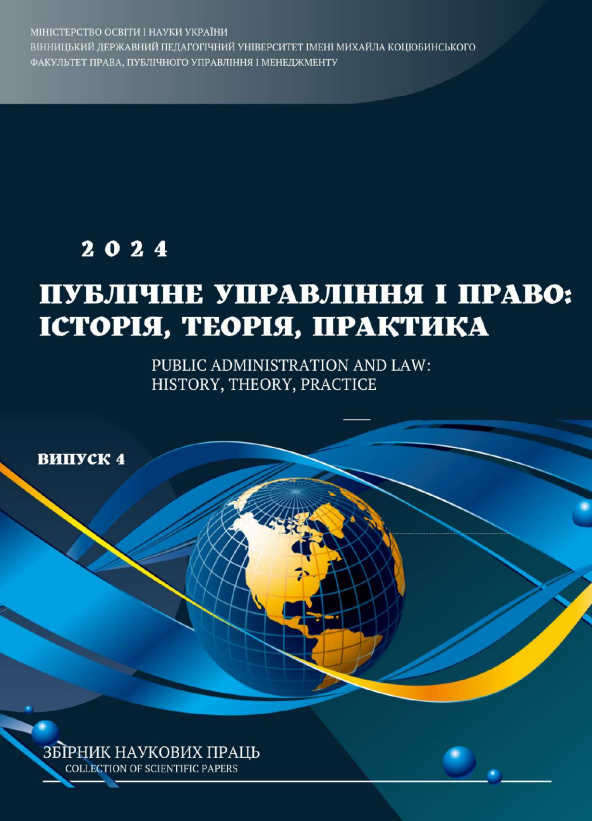Articles
ARTIFICIAL INTELLIGENCE RESEARCH METHODOLOGY
https://doi.org/10.31652/2786-6068-2024-4-82-87Published 2024-09-18
Keywords
- artificial intelligence,
- nature of AI,
- classification of AI,
- legal regulation of AI,
- types of AI
How to Cite
ARTIFICIAL INTELLIGENCE RESEARCH METHODOLOGY. (2024). Public Management and Law History Theory Practice, 4, 85-90. https://doi.org/10.31652/2786-6068-2024-4-82-87
Abstract
Summary. Artificial intelligence (AI) is rapidly developing, influencing various spheres of human life, which requires its legal regulation. But first of all, it is necessary to investigate its legal nature, classification and legal aspects. In this scientific article, an analysis of the scientific literature on the given topic «Methodology of artificial intelligence research» was carried out, as a result of which tasks, the basis of the study and conclusions were formed. The article examines social relations regarding the formation, use, functioning, application and development of AI in Ukraine.Downloads
Download data is not yet available.
References
- Understanding the four types of AI, from reactive robots to self-aware beings. Arend Hintze. The Conversation. Retrieved from: https://theconversation.com/understanding-the-four-types-of-ai-from reactive-robots-to-self-aware-beings-67616
- AI: modna ihrashka chy nova promyslova revoliutsiia?: prezentatsiia vebinaru [AI: Fashion Toy or New Industrial Revolution?: Webinar Presentation] (2020). Kompaniia «Deloitte» v Ukraini: veb sait. Retrieved from: https://www2.deloitte.com/content/dam/Deloitte/ua/Documents/webinar/Webinar_AI_ 21.05.2020.pdf [in Ukranian].
- Baranov, O. A. (2023). Vyznachennia terminu «shtuchnyi intelekt» [Definition of the term «artificial intelligence»]. Informatsiia i pravo. 1(44), 32-49. Retrieved from: https://doi.org/10.37750/2616- 6798.2023.1(44).287537 [in Ukranian]. DOI: https://doi.org/10.37750/2616-6798.2023.1(44).287537
- Korzh, I. F. (2017). Obiekt i predmet naukovoho doslidzhennia v informatsiinii sferi [Object and subject of scientific research in the information sphere]. Informatsiia i pravo. 3(22). 22-29. Retrieved from: https://doi.org/10.37750/2616-6798.2017.3(22).273041[in Ukranian]. DOI: https://doi.org/10.37750/2616-6798.2017.3(22).273041
- Kronivets, T.M. & Tymoshenko, Ye.A. (2022). Pravovi ta tsinnisni osoblyvosti fenomenu shtuchnoho intelektu yak elementu pravovoi diisnosti [Legal and value features of the phenomenon of artificial intelligence as an element of legal reality]. Naukovyi visnyk KhDU. Seriia «Iurydychni nauky». 2. 20-22. Retrieved from: https://doi.org/10.32999/ksu2307-8049/2022-2-4[in Ukranian]. DOI: https://doi.org/10.32999/ksu2307-8049/2022-2-4
- Lande, D.V. & Furashev, V.M. (2023). Parlamentskyi kontrol iz zastosuvanniam heneratyvnoho shtuchnoho intelektu [Parliamentary control with the use of generative artificial intelligence] : monohrafiia. Kyiv. TOV «Inzhynirynh». 202 s. [in Ukranian].
- Lebedieva, H.V. (2021). Zakhyst prav ta interesiv fizychnykh osib, porushenykh unaslidok vykorystannia obiektiv prava intelektualnoi vlasnosti [Protection of the rights and interests of natural persons violated as a result of the use of objects of intellectual property rights]. Odesa. 207 s. [in Ukranian].
- Lubko, D. V. & Sharov, S. V. (2019). Metody ta systemy shtuchnoho intelektu [Methods and systems of artificial intelligence]: navch. posib. Melitopol. FOP Odnoroh T.V. 264. [in Ukranian].
- Systemy shtuchnoho intelektu v planuvanni, modeliuvanni ta upravlinni [Artificial intelligence systems in planning, modeling and management] (2011) : pidruchnyk dlia stud. vyshchykh navch. zakladiv / za red. L. S. Yampolskoho, B. P. Tkacha, O. I. Lisovychenko. Kyiv. 544 s. [in Ukranian].
